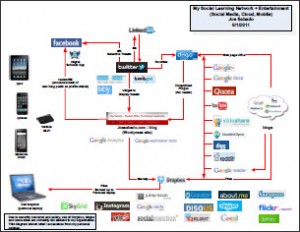I was talking with someone working in higher education IT a few days ago about social media and why I have embraced it. He told me “No way will I be interested in social media. If you watched the movie Social Network, you’ll know that Zuckerberg created facebook so his buddies could get laid.” He also told me “I don’t want to know what some mom cooked for breakfast.” So I asked him if he has a daughter and he tells me he does. I asked him “Who’s going to teach your daughter about how to properly use social media?” and his response was “Not me.” With the realization that I could not convince him about at least understanding social media and that they won’t go away soon, I changed the topic. The negative attitude towards social media by some IT professionals is understandable given the security and policy implications. In some sense, social media also represents some loss of control when it comes to what and how technology should be used in the workplace.
Based on my short experience using social media, I would urge other colleagues who work in higher education IT to give social media a chance for the following reasons:
- Keep up with trends. I have observed the following the last couple of years:
- Increasing use of mobile devices on our campus by students and staff.
- Increasing requests from departments we serve to use external software services for their business needs.
- Increasing social media presence by campus departments, student organizations.
Before I started using twitter last year, I didn’t realize there was actually a term for this phenomenon and it is not unique to our campus. This trend is called “consumerization of IT” and is defined on Wikipedia as “trend for new information technology to emerge first in the consumer market and then spread into business organizations, resulting in the convergence of the IT and consumer electronics industries, and a shift in IT innovation from large businesses to the home.”
- Understand our customers. How can we serve our customers if we don’t know their mindset and tools they use? By just observing the communication between students and our staff on facebook and the general conversations on twitter, IT staff can learn a lot about issues/trends that cannot be found anywhere else.
- Professional Development. Every day I log onto facebook, google+, twitter, youtube, slideshare and other social media websites, I consider them as free learning opportunities. I have only attended 2 conferences the last 4 years due to lack of training budgets but I have used social media as my personal learning network (PLN) and have learned a lot about mobile web development, social media and leadership. When I read blogs by experts in technologies and higher ed, I find insights than typical articles and websites would often reveal.
- Be Relevant and credible. As more of our customers demand to use consumer technologies, inevitably, appropriateness and policy issues will come up for discussion. Would I really be credible as an IT professional if I don’t even know how these technologies work? Part of the reason why I spend so much time on social media is to research how they work and how they relate to our business, including what issues to consider. If I have to take the position of rejecting a customer’s proposal to use an external service, I want to be able to credibly tell them the reasons for my position. On the other hand, if I do approve their proposal, I need to be able to assist them in using the service that is consistent with university policies and in ways they may not have thought of.
- Keep up or get left behind. I was told a year ago that social media is a fad and so is Skype so I shouldn’t bother investing any time/resources investigating it for business use. I was also told students do not use mobile devices. Ironically, part of what motivated me to be on social media is to find out for myself on whether what I am being told are actually true. Given the pace at which consumer technology changes, it is a challenge to keep up. I generally spend up to 4 hours most nights just learning new technologies including mobile web and social media and I still feel as if I am behind. In some ways, I consider the time I spend on social media as career investment. I don’t know what IT will look like five years from now but all I know is that the convergence of social media and the enterprise will be even greater than what it is today and I want to be in a position where my knowledge lie in both areas to be employable, competing against our current students who will have entered the work place and who have far greater knowledge about consumer technologies than I do.
- Learn about hobbies, personal interests; connect with folks with same interests. While I hear stereotypes about IT folks as not being too sociable and have no lives, all the IT folks I work with have some outside interests/hobbies. I spend my weekends watching sports and it’s fun being able to watch the games with others that are in different cities, states and in some cases, other countries.
Social media definitely have some pitfalls but I think the benefits outweigh the risks. For anyone working in higher education, not just IT, the days of questioning the values of social media in higher education is long gone. If we are to stay relevant and provide quality customer service, we need to do our part to understand the current needs of our customers and future trends so that we are prepared to adopt them rather than reacting.
What other reasons should higher education IT staff be on social media?


